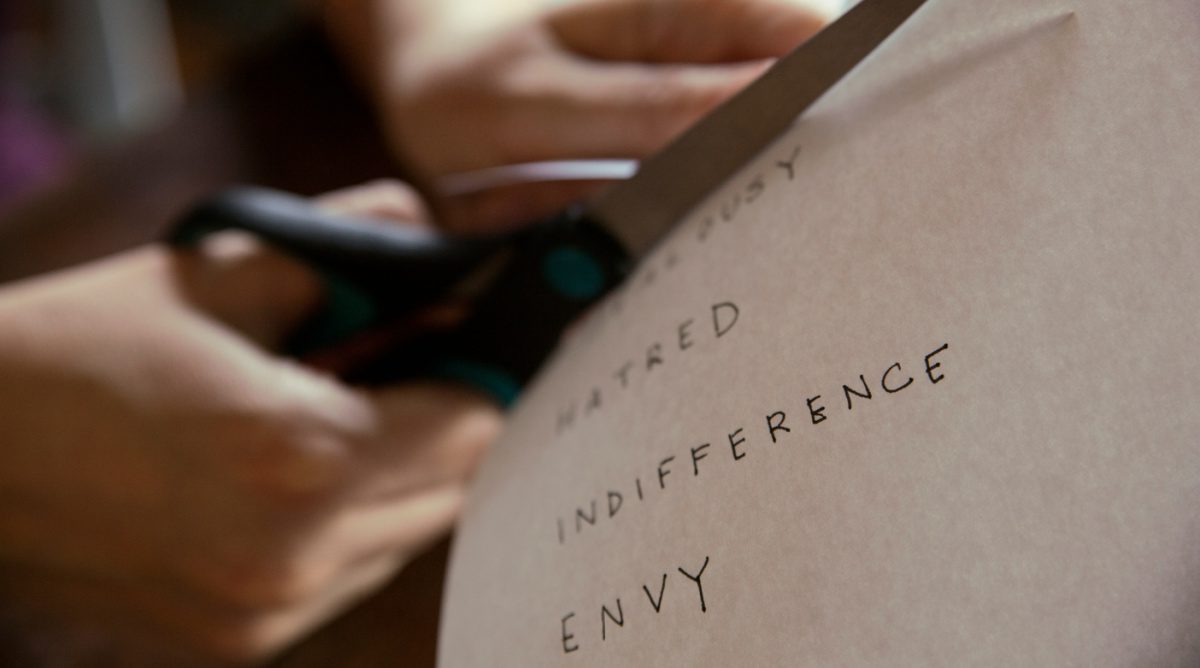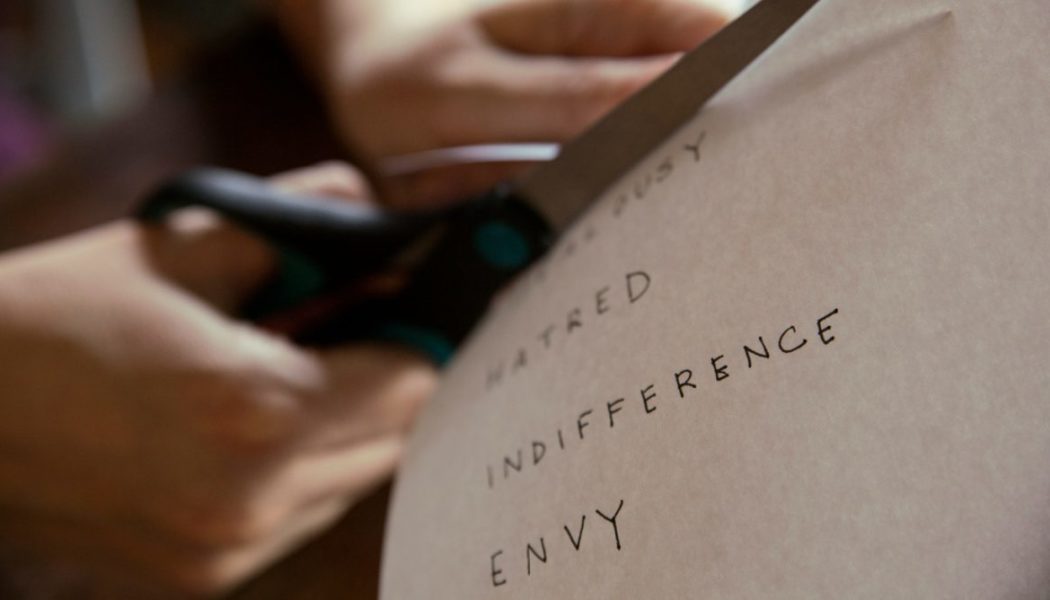
Once, long ago in my twenties, I was immersed in a book about the last conversations St Therese of Lisieux had with her sisters Pauline and Marie as she lay slowly and painfully dying of tuberculosis. One of the conversations Pauline was careful to write down was on the evening St. Therese quietly observed in her uncomplicated way, “I look forward to Heaven. For there will be no envy there. Everyone will be content and will be filled with such happiness for one another”.
I always appreciated the gift of that little sentence and have been grateful she said it out loud to someone. She of course felt the sting of others’ envy in her short life. The little girls in her school envied her beautiful hair all curled lovingly by her mother. They envied her being good at schoolwork. Later, in the Monastery she was envied because she followed the rule so carefully and earnestly, perhaps putting their own laxer efforts to shame. They said it was easier for her because she had actual blood sisters there with her in the monastery to support her, though in reality she never once depended on any of her blood sisters to defend her.
Nuns, even nuns, as great as they are, can fall into the grip of envy. One nun even went so far as to put dirt in Therese’s morning oatmeal because she was envious of her. And others were always saying things like, “how can a big, smiling girl like yourself know what suffering is?” as if to intimate that she had no business understanding suffering until she was old and expert like they were.
Therese was sensitive, she was passionately French, and I know it cut her to the quick. I know at first it must have left her feeling isolated, perhaps questioning herself and her lovability, and it was certainly at times emotionally exhausting for her to bear.
How could it not be? The barbs of envy pierce deeply.
But she learned over time to extend a well-fought for love and silence to those who envied her.
That is why she is a wrought iron little flower.
That is why she is a saint.
But I am still glad she mentioned it at the end of things, almost with a sigh. Envy would come to an end. And she was happy about it.
Envy would come to an end. And she was happy about it.
It has often struck me that most of us are willing to own up to the vice of pride in a general sense.
But when that pride is manifested mostly in the nasty little vice of envy, we all tend to avoid talking about it, let alone owning up to it.
It makes us uneasy to think we could possibly want what someone else has so much that we are willing to destroy them for it. We have all, if we are honest, envied someone somewhere along the line. If we say we haven’t, the truth is not in us. We hate the feelings envy brings with it, but they can be very strong and tenacious at times. If allowed to fester, the way many people deal with envy’s stranglehold on their own heart and mind is to unburden it through gossip or innuendo or self-righteous behavior.
Envy likes company and allies. This is how she acquires them.
Envy is secretive. She stands aloof at the back of crowds whispering innuendo like the Pharisees when Jesus was preaching. Envy waits like a cat at a mouse hole listening attentively for a mistake to be made that it might pounce and steal.
Envy baits. It sneers. It creates doubts in others’ minds. It extends the silent treatment. It is a Queen Bee of the worst kind.
In our time, envy can be found trolling and stalking about on social media obsessed by the success of unsuspecting others and wanting to take it for itself. Comment sections are sometimes rife with it under the pretext of “honest talk”. In its worst but most realistically nasty form, it can be found in Tolkien’s character Gollum, who doesn’t quit until he wrests the prize away even as he is falling to his death into Mount Doom. One of my good friends once remarked that Gollum is the perfect characterization of envy – small yet ignobly powerful and ultimately all-consuming. Who of us wants to be that? Small, ignoble, nasty, and calculating. It goes against all that is truly good and human in us. So we hide it. We avoid any detection.
And that is where the evil one gets us.
We hardly ever hear from or say to another, “Wow, I was envious. I am really sorry about that!” as we would perhaps more easily apologize for another fault like getting angry. It needs to be admitted more because then it is in the light and somehow the light can diffuse it and truth wins. One can even laugh about it when one finally says it out loud, since most times it is ridiculous. It’s one of those vices that grows to 500 times its normal size in dark, inner places.
I try to think of the Pharisees when I think of that dark inner festering. They wanted to keep their precious status and control in the community. He was getting the attention that was theirs! So, they killed Jesus for it – even KNOWING he was God. Now that’s a strong and deadly sin! Envy can eat away at a soul and it leaves it in constant unrest, constant vigilance, constant exhaustion at its constant need to steal all the prizes no matter how. The envious are never at peace. For that, they are to be pitied and prayed for: to be released from the snare.
That thought, though, brings us to another side of the coin. It is a given that envy hurts the envying one by obsession and no peace of soul. But envy can also deeply hurt the one envied, and in so many cases lead that person to stop doing good works because they don’t want to feel that evil stare or the power of wagging tongues. Nor can they shoulder for long the deep, burdening hurt of not quite understanding why they are so despicable in someone else’s eyes. That another person truly wishes them to be unhappy. This is sometimes what I think when Jesus talks about the talents in the Gospel. Perhaps that last man, the one who buries his talent, is afraid to be “talented”. Human beings want so much to belong to the group, to be a part of the whole, to contribute, to be praised and loved. Other people’s envy can kill that dead and perhaps leave a once tender heart cold and jaded.
And depending on the temperament, it can really take a large toll on a woman. If she is sanguine, she will feel left out of the group – the kiss of death to a sanguine heart. If she is phlegmatic, she will be tempted to return to the shell from which she had just bravely ventured forth with an idea or a plan that was great, only for it to be snatched away from her and attributed to someone else out of envy. If she is melancholic she might brood and cry a lot over how to approach her tormentors in love and forgiveness, and if she is choleric there will most surely be a plan of retaliation waiting in the wings.
None of these are good. All of these are temptations to sin.
We are commanded to use the talents God has given us. We must be creative. We must serve. We must have good ideas. We must rejoice. And we cannot stop doing it because someone envies those plans, ideas, or creative projects and makes us feel bad for having them. To stop out of fear would be giving in to human respect big time.
But to the envious ones, think of this. By your envy, your gossip, your theft of other’s ideas, self-esteem, peace of soul – you are perhaps tempting someone to bury their talents – which is also a sin, and something Jesus forbids them to do.
In the end, let’s think about it more clearly and openly next time we are in a mess that envy has caused. Let it be owned and confessed and forgiven in a straightforward, open manner. No one will be surprised. We all have been there. And if you are the victim of an envious person’s machinations, keep bravely coming up with ideas, and thoughts, and plans despite the pain you feel from those wagging tongues.Let’s not tempt one another into sin.
Let’s remember that it was this exact sin of envy that killed Jesus.
It was hard to even write this because everyone seems so leary of talking about it. But I felt that it might be helpful and needed to be expressed in the ‘open air’.
“Let us love in deed and not just talk about it.”
________________________________________________________
Image courtesy of Unsplash
This post was originally published in The Inscapist and is republished here with permission.








